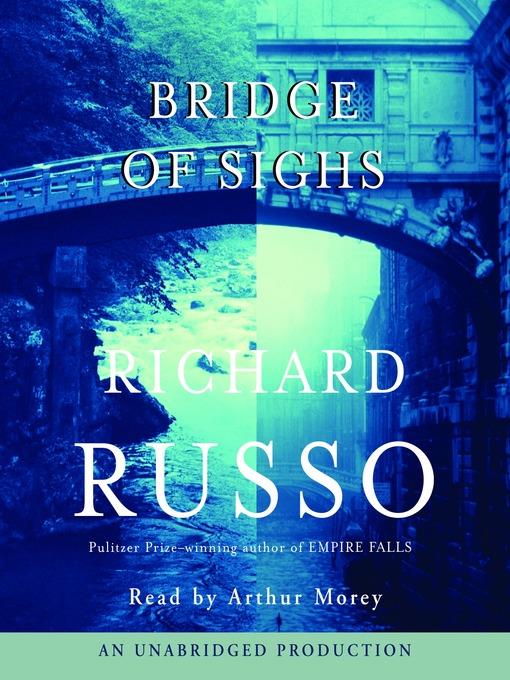
Bridge of Sighs
کتاب های مرتبط
- اطلاعات
- نقد و بررسی
- دیدگاه کاربران
نقد و بررسی

Pulitzer Prize-winning novelist Richard Russo continues to plumb the depths of decaying small towns in the Northeast U.S., unearthing hard-won truths and heartrending revelations. The talented Arthur Morey perfectly matches the even tone and pacing of the narrative as the listener is drawn into the life of the unfortunately nicknamed Lou C. (Lucy) Lynch and his best friend, artist Bobby Marconi. Morey's portrayal of the laconic and introspective Lucy is juxtaposed with his take on Marconi and his energetic life in Venice. Humorous, insightful, and haunting, Morey's delivery of this portrait of Main Street America is both elegant and sublime. R.O. (c) AudioFile 2008, Portland, Maine

August 13, 2007
Signature
Reviewed by
Jeffrey Frank
Richard Russo’s portraits of smalltown life may be read not only as fine novels but as invaluable guides to the economic decline of the American Northeast. Russo was reared in Gloversville, N.Y. (which got its name from the gloves no longer manufactured there), and a lot of mid–20th-century Gloversville can be found in his earlier fiction (Mohawk
; The Risk Pool
). It reappears in Bridge of Sighs
, Russo’s splendid chronicle of life in the hollowed-out town of Thomaston, N.Y., where a tannery’s runoff is slowly spreading carcinogenic ruin.
At the novel’s center is Lou C. Lynch (his middle initial wins him the unfortunate, lasting nickname “Lucy”), but the narrative, which covers more than a half-century, also unfolds through the eyes of Lou’s somewhat distant and tormented friend, Bobby Marconi, as well as Sarah Berg, a gifted artist who Lou marries and who loves Bobby, too. The lives of the Lynches, the Bergs and the Marconis intersect in various ways, few of them happy; each family has its share of woe. Lou’s father, a genial milkman, is bound for obsolescence and leads his wife into a life of shopkeeping; Bobby’s family is being damaged by an abusive father. Sarah moves between two parents: a schoolteacher father with grandiose literary dreams and a scandal in his past and a mother who lives in Long Island and leads a life that is far from exemplary.
Russo weaves all of this together with great sureness, expertly planting clues—and explosives, too—knowing just when and how they will be discovered or detonate at the proper time. Incidents from youth—a savage beating, a misunderstood homosexual advance, a loveless seduction—have repercussions that last far into adulthood. Thomaston itself becomes a sort of extended family, whose unhappy members include the owners of the tannery who eventually face ruin.
Bridge of Sighs
is a melancholy book; the title refers to a painting that Bobby is making (he becomes a celebrated artist) and the Venetian landmark, but also to the sadness that pervades even the most contented lives. Lou, writing about himself and his dying, blue-collar town, thinks that “the loss of a place isn’t really so different from the loss of a person. Both disappear without permission, leaving the self diminished, in need of testimony and evidence.”
If there are false notes, they come with Russo’s portrayal of African-Americans, who too often speak like stock characters: (“Doan be given me that hairy eyeball like you doan believe, ’cause I know better,” says one). But Russo has a deep and real understanding of stifled ambitions and the secrets people keep, sometimes forever. Bridge of Sighs
, on every page, is largehearted, vividly populated and filled with life from America’s recent, still vanishing past.
Jeffrey Frank’s books include
The Columnist and
Bad Publicity. His novel,
Trudy Hopedale, was published in July by Simon & Schuster.

December 24, 2007
The challenge facing those who perform Russo's novels is the self-effacing, low-key nature of his protagonists. The line between a faithful rendition of the character and a snoozer may be as narrow as the street that divides the rich from the poor in Russo's upstate New York town of Thomaston. Unfortunately, Morey's performance finds itself the poor side of the tracks. Lou C. (“Lucy”) Lynch's narration of events is read in an even, objective tone as if Morey were reading the evening news on an amateur radio show. He does emphasize words and ideas, but the overall effect is monotonous and doesn't do justice to Russo's rich material. Morey's narrative voice for Bobby, Lucy's childhood friend and nemesis, is deeper but more of the same. Morey gives a bit more energy to the third narrator, Sarah, Lou's wife. The result is more soporific than a Thanksgiving turkey, and getting through Russo's sharp account of the factory towns he knows so well becomes more a chore than a pleasure. Simultaneous release with the Knopf hardcover (Reviews, Aug. 13).

























دیدگاه کاربران